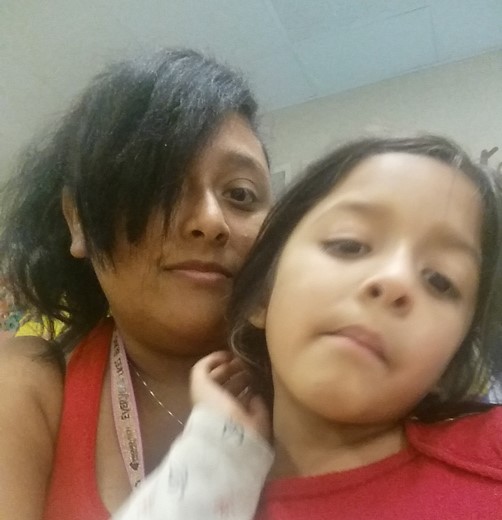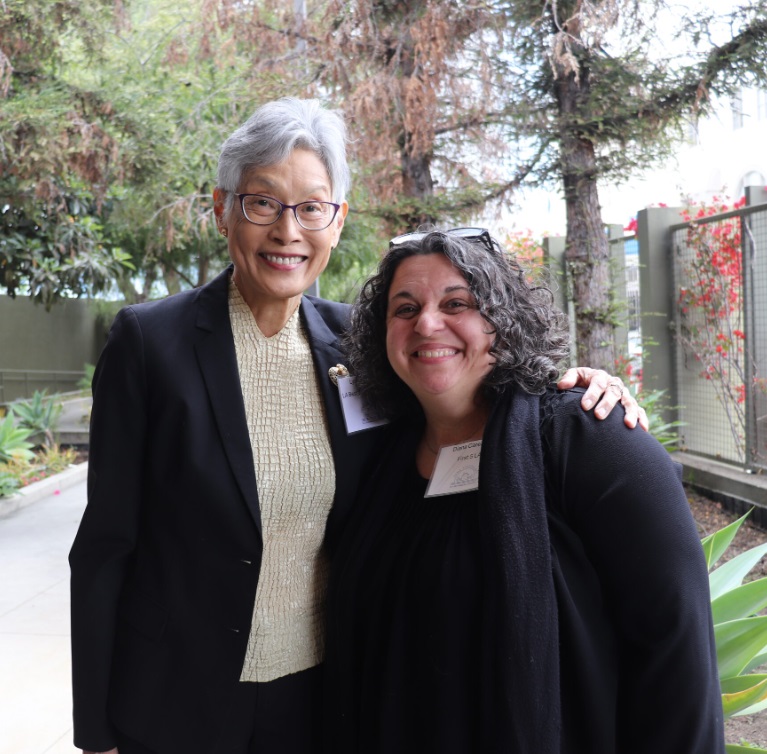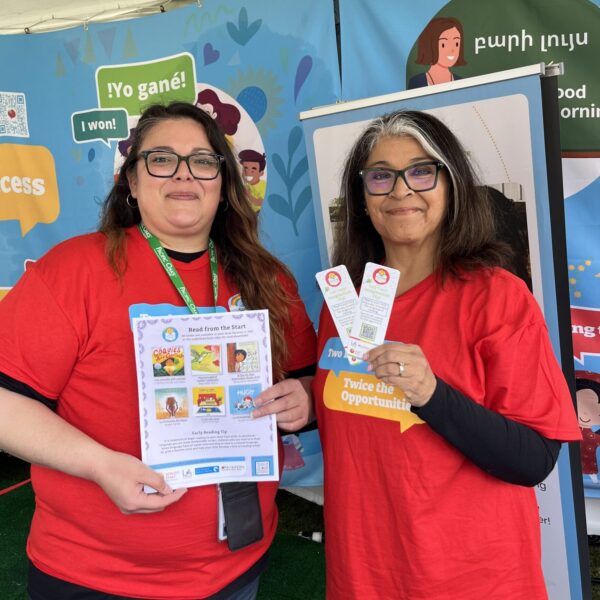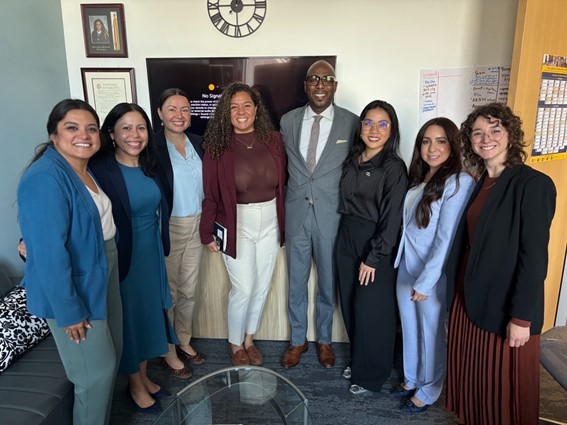When Michelle Catalan moved from Los Angeles to Orange County, she discovered that the nearby preschool had an impossibly long waiting list for her then 4-year-old daughter, Evana. Nor were there any preschool slots available near her work as a cashier. After a couple of months searching for early education, the 21-year-old mother made a choice.
“I didn’t want my daughter to be out of school,” she recalled, “so I gave up my job and moved back to L.A. where I was able to place her in preschool.”
Meanwhile, Jovita Garcia was riding four buses back and forth through Los Angeles just to take her 4-year-old daughter to preschool.
“On the days I didn’t have money to pay for the bus rides, she didn’t attend preschool,” Garcia, now 45, recalled. “The administration would call me and say that if she didn’t attend I would have to give away her space. I asked them to help me find other options closer to home but they couldn’t give me any.”
Garcia, a member of Best Start Metro LA, was left with only one choice: rearrange her life so that her daughter could attend preschool from 3:15 to 6:45 p.m. Said Garcia: “I don’t like the schedule but it’s the only option I have.”
“The governor’s budget saddens me. My son Michael is 2 ½ and I can’t find affordable care for him anywhere.” – Yanci Panameno
With months-long waiting lists and the distance between available preschool slots measured over multiple bus routes, Catalan and Garcia represent many of the L.A. County parents of young children who are stretched to their limits in their search for early care and education.
So when California Gov. Jerry Brown announced in his budget proposal this month that he was suspending a previously promised funding increase in 2017-18 for nearly 3,000 new preschool slots in the state, parents were left feeling like they – and their children – had been slapped with a fiscal “time-out”.
“The governor’s budget saddens me,” said Yanci Panameno, a mother of three and member of Best Start Panorama City & Neighbors. “My son Michael is 2 ½ and I can’t find affordable care for him anywhere. Both my husband and I work, but with caring for Michael and our two school-aged other kids, paying full price for quality child care is out of the question. And even if we could, there are only two programs in the area and they are full. It’s a real problem, not just for us but for so many families in the community.”
Early care educators were also feeling stung by the governor’s proposed budget, which also defers increases to child care provider reimbursement rates which he earlier promised through 2020.
“The governor’s previous promise of reimbursement and increase of preschool slots really brought a lot of hopes up,” said Veronica Montaño Sanchez, a mother, Best Start Panorama City & Neighbors member and head teacher at an early education program. “Now that he is holding that back, it feels like a slap in the face. He is messing with our hugest asset – our children.”
First 5 LA leaders have joined such parents, teachers, other child advocates and elected leaders voicing concern over the suspension of early care and education funding, saying that the governor missed an opportunity to build a stronger economy for generations to come.
“The research is clear: if we fail to invest in kids’ programs, we stunt future economic growth. Now is the time to make investments that have a demonstrated rate of return,” said Kim Belshé, Executive Director of First 5 LA. “By investing in the state’s youngest residents we can strengthen our state and build a better economy for generations to come.”
According to a new study by Nobel Prize-winning economist James Heckman and researchers at the University of Southern California and the University of Chicago, high-quality early childhood development programs support economic mobility for two generations by freeing working parents to increase wages over time, while their children develop a broad range of foundational skills for lifelong success.
The findings show high-quality early childhood programs deliver an annual return of 13 percent per child on upfront costs through better outcomes in education, health, employment and social behavior in the decades that follow.
“The research is clear: if we fail to invest in kids’ programs, we stunt future economic growth” -Kim Belshé
California slashed more than $1 billion during the recession for subsidized child care programs for infants and toddlers of low-income working parents and preschool for older children. Those cuts eliminated child care and preschool opportunities for tens of thousands of working families.
If the Brown Administration’s budget proposal were to go into effect, it will zero out around $226 million slated for early childhood expansion.
“In real world impacts, it has very immediate implications,” Kim Pattillo Brownson, Vice President of Policy and Strategy for First 5 LA, said in an interview on KPCC Radio. “There are about 3,000 young children and their families slated to have early learning opportunities made available to them who now will not.”
This sentiment was echoed by other leading children’s advocates.
“These investments are essential to children and families, and research clearly shows that early learning programs are some of the most cost effective investments that government can make in the future of our children,” said Ted Lempert, President of Children Now, a nonpartisan umbrella research, policy development and advocacy organization dedicated to promoting children’s health, education, and well-being in California.

In revealing his fiscal prudence behind his 2017-18 budget proposal, the governor cited a projected $1.6 billion deficit by next summer. For a detailed description of Gov. Brown’s budget proposal as it relates to early childhood investments important to First 5 LA, click here.
According to a statewide survey by the Public Policy Institute of California, the overwhelming majority of Californians say attending preschool is very important (68 percent) or somewhat important (21 percent) to student success in elementary and secondary education. At the same time, 67 percent of likely voters say the state government should fund voluntary preschool programs for all 4-year-olds in California.
Many elected leaders and children’s advocates reflect this public and voter support for ECE in expressing their own reactions to the governor’s budget proposal. These include:
- The California Legislative Women’s Caucus
- Assemblymember Kevin McCarty
- First 5 California
- Advancement Project
- United Ways of California
- Common Sense Kids Action
- The California Child Care Resource and Referral Network
The governor’s budget is the first step in the public process to negotiate and finalize a budget agreement with the Legislature. The budget proposal will be heard by various legislative committees, in May the Department of Finance will update revenue projections and modify the budget to reflect more accurate assumptions, and in June the Legislature will submit its final budget to the governor for his signature.
“All children should have access to quality, affordable early care and education – it’s the foundation for our state’s future prosperity.” –Kim Belshé
Meanwhile, First 5 LA’s Public Policy and Government Affairs Department has been working with the state Early Care and Education budget coalition, a group of ECE advocates and provider groups engaged in state policy, to work with the Legislature and Administration to ensure the governor’s promises are kept in the final 2017-18 budget deal. And on January 31, First 5 LA’s leadership will participate in the annual First 5 Advocacy Day in Sacramento, one of many opportunities it has to engage with state policymakers throughout the year.
“In the months ahead, we will continue our work with our advocacy partners, the governor, and the Legislature to ensure our state budget better reflects the priorities of Californians,” Belshé said. “All children should have access to quality, affordable early care and education – it’s the foundation for our state’s future prosperity.”
If Gov. Brown wants proof, he can just ask Michelle Catalan.
After moving back to Los Angeles from Orange County for her daughter to finish preschool, Catalan’s daughter is now in first grade, where she is doing better than many other students in her classroom.
“The teacher says my daughter is a good student,” said Catalan, a member of Best Start Watts/Willowbrook. “But there are a lot of kids who did not go to kinder or preschool. Most of them don’t know their numbers or how to write their name yet. It’s like they say, the first five years is the best time for a kid to learn.”






